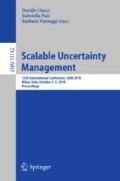Abstract
We propose a generic numerical measure of inconsistency of a database with respect to a set of integrity constraints. It is based on an abstract repair semantics. A particular inconsistency measure associated to cardinality-repairs is investigated; and we show that it can be computed via answer-set programs.
L. Bertossi—Member of the “Millenium Institute for Foundational Research on Data” (IMFD, Chile). Research supported by NSERC Discovery Grant #06148.
Access this chapter
Tax calculation will be finalised at checkout
Purchases are for personal use only
Notes
- 1.
Abstract distances between two point-sets are investigated in [8], with their computational properties. Our setting is a particular case.
- 2.
For INDs repairs based only on tuple deletions can be considered [6].
- 3.
Other possible measures for single FDs and relationships between them can be found in [11].
- 4.
For certain forms of prioritized repairs, such as endogenous repairs, the normalization coefficient |D| might be unnecessarily large. In this particular case, it might be better to use \(|D^n|\).
- 5.
- 6.
References
Bertossi, L.: Characterizing and computing causes for query answers in databases from database repairs and repair programs. Corr Arxiv cs.DB/1712.01001 (2018). Proc. FoIKs. LNCS, vol. 10833, pp. 55–76. Springer (2018)
Bertossi, L.: Database Repairing and Consistent Query Answering. Synthesis Lectures on Data Management. Morgan & Claypool, San Rafael (2011)
Bertossi, L., Salimi, B.: From causes for database queries to repairs and model-based diagnosis and back. Theory Comput. Syst. 61(1), 191–232 (2017)
Bertossi, L., Rizzolo, F., Jiang, L.: Data quality is context dependent. In: Castellanos, M., Dayal, U., Markl, V. (eds.) BIRTE 2010. LNBIP, vol. 84, pp. 52–67. Springer, Heidelberg (2011). https://doi.org/10.1007/978-3-642-22970-1_5
Brewka, G., Eiter, T., Truszczynski, M.: Answer set programming at a glance. Commun. ACM 54(12), 93–103 (2011)
Chomicki, J., Marcinkowski, J.: Minimal-change integrity maintenance using tuple deletions. Inf. Comput. 197(1–2), 90–121 (2005)
Caniupan-Marileo, M., Bertossi, L.: The consistency extractor system: answer set programs for consistent query answering in databases. Data Knowl. Eng. 69(6), 545–572 (2010)
Eiter, T., Mannila, H.: Distance measures for point sets and their computation. Acta Inform. 34, 109–133 (1997)
Grant, J., Martinez, M.V. (eds.): Measuring Inconsistency in Information. College Publications, Los Angeles (2018)
Grant, J., Hunter, A.: Analysing inconsistent information using distance-based measures. Int. J. Approx. Reason. 89, 3–26 (2017)
Kivinen, J., Mannila, H.: Approximate inference of functional dependencies from relations. Theor. Comput. Sci. 149, 129–l49 (1995)
Leone, N., et al.: The DLV system for knowledge representation and reasoning. ACM Trans. Comput. Logic. 7(3), 499–562 (2006)
Meliou, A., Gatterbauer, W., Moore, K.F., Suciu, D.: The complexity of causality and responsibility for query answers and non-answers. Proc. VLDB 4, 34–41 (2010)
Rajamaran, A., Ullman, J.: Mining of Masssive Datasets. Cambridge University Press, Cambridge (2012)
Staworko, S., Chomicki, J., Marcinkowski, J.: Prioritized repairing and consistent query answering in relational databases. Ann. Math. Artif. Intell. 64(2–3), 209–246 (2012)
Thimm, M.: On the compliance of rationality postulates for inconsistency measures: a more or less complete picture. Künstliche Intell. 31(1), 31–39 (2017)
Author information
Authors and Affiliations
Corresponding author
Editor information
Editors and Affiliations
Rights and permissions
Copyright information
© 2018 Springer Nature Switzerland AG
About this paper
Cite this paper
Bertossi, L. (2018). Measuring and Computing Database Inconsistency via Repairs. In: Ciucci, D., Pasi, G., Vantaggi, B. (eds) Scalable Uncertainty Management. SUM 2018. Lecture Notes in Computer Science(), vol 11142. Springer, Cham. https://doi.org/10.1007/978-3-030-00461-3_26
Download citation
DOI: https://doi.org/10.1007/978-3-030-00461-3_26
Published:
Publisher Name: Springer, Cham
Print ISBN: 978-3-030-00460-6
Online ISBN: 978-3-030-00461-3
eBook Packages: Computer ScienceComputer Science (R0)

